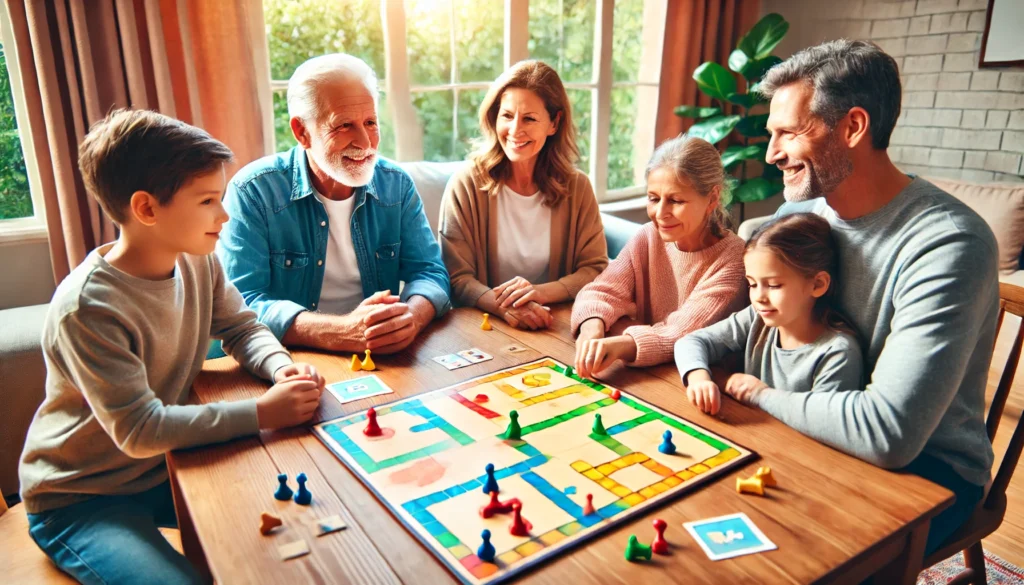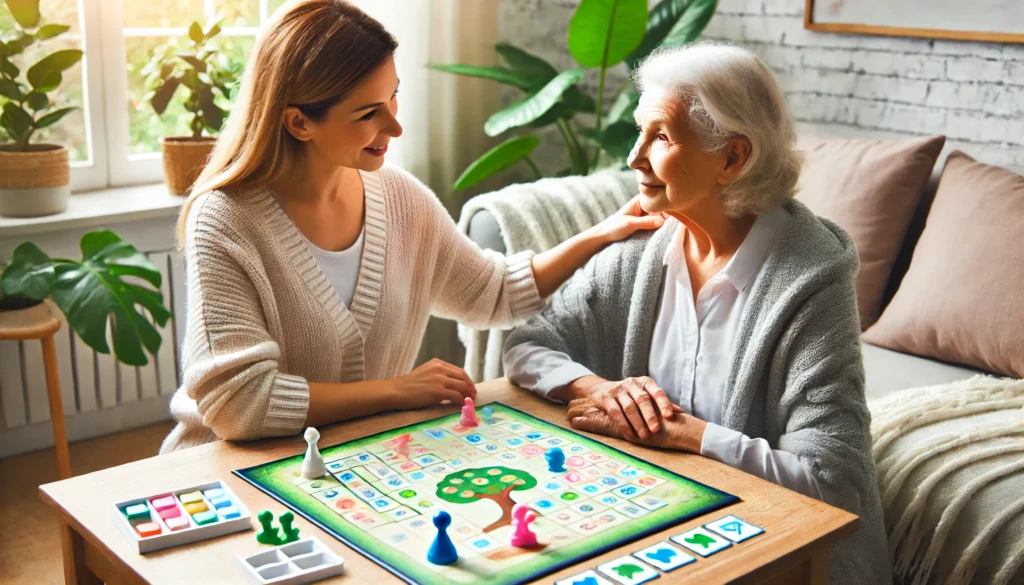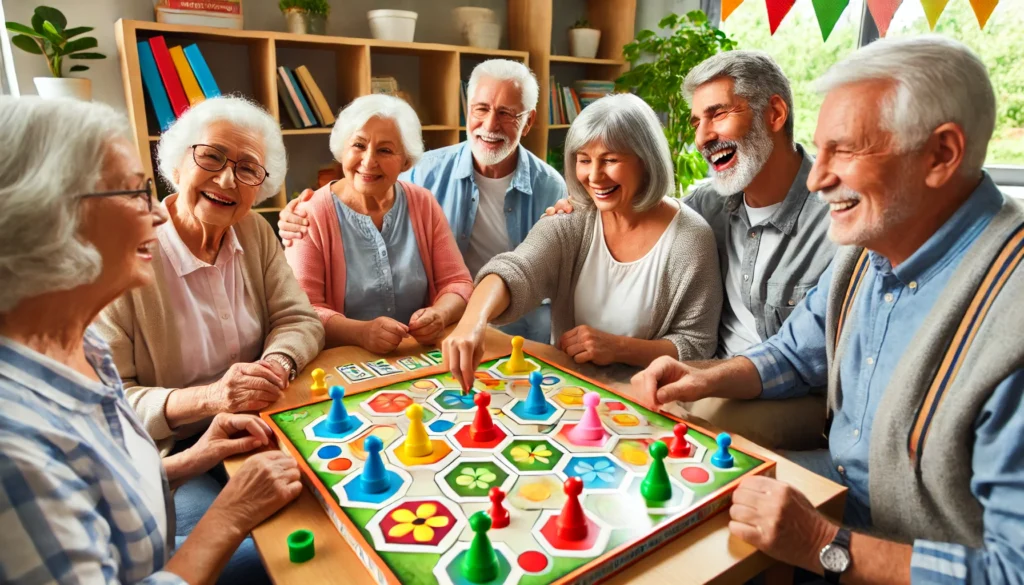Board games have long been appreciated for their ability to bring people together, spark joy, and stimulate cognitive faculties. For seniors with dementia, these games serve as more than just pastimes. They become tools for memory stimulation, problem-solving, and maintaining dexterity.
You may also like: Boost Your Mind: Top Brain Games
Historical Context
Historically, games have been embedded in human culture as a means of learning, socialization, and leisure. From ancient Egyptian Senet to the royal game of Ur, societies have used games to pass down traditions and train cognitive skills. This rich tradition of gaming has evolved over millennia, adapting to cultural shifts and technological advancements. Ancient games often mirrored life skills, teaching strategies that were crucial for survival and societal harmony.
As games traveled across cultures and continents, they became more complex, integrating elements of strategy, chance, and narrative. This evolution reflects humanity’s enduring desire to challenge the mind while fostering communal ties. In today’s context, the essence of these ancient games lives on, repurposed to serve modern needs, such as aiding individuals with cognitive impairments.
Current Trends in Dementia Care
In recent years, there has been a surge in the development of board games specifically designed for seniors with dementia. These games incorporate elements that are familiar and comforting, reducing anxiety and encouraging participation. The design of these games often considers the sensory and cognitive limitations that accompany dementia, ensuring they are accessible and enjoyable for all players.
The market for such games is rapidly expanding as awareness of dementia’s impact grows. Designers are increasingly collaborating with psychologists and geriatricians to create games that offer therapeutic benefits. This interdisciplinary approach ensures that games are not only fun but also serve as effective tools for cognitive engagement.
Additionally, many of these games aim to preserve dignity and autonomy in seniors. By allowing individuals to reminisce and engage actively, these games can help maintain a sense of identity and purpose, crucial elements in dementia care.
Cognitive Engagement Through Play
The concept of play as a therapeutic tool is gaining traction in dementia care circles. Play encourages experimentation, creativity, and learning, which can be invaluable for cognitive health. Board games, in particular, provide structured environments where seniors can exercise their minds safely.
The repetitive nature of games can also be beneficial, reinforcing memory and enhancing cognitive function through practice. By engaging multiple cognitive domains, such as memory, attention, and problem-solving, board games can potentially delay the progression of dementia symptoms.
Benefits of Board Games for Seniors with Dementia
Cognitive Stimulation
Board games designed for dementia patients are crafted to enhance cognitive function. Memory games, for instance, help stimulate recall and recognition, which are vital cognitive processes affected by dementia. Games such as “Call to Mind” are specifically designed to promote conversations and reminiscence, tapping into long-term memory and encouraging mental engagement.
These games often incorporate multi-sensory elements to enhance cognitive stimulation. Visual aids, tactile pieces, and auditory prompts work in tandem to engage the brain more fully. By appealing to various senses, these games can rekindle dormant memories and associations, offering a holistic cognitive workout.
Furthermore, cognitive stimulation through gameplay can lead to improvements in concentration and attention span. Regular engagement with challenging yet achievable tasks can help maintain mental sharpness, providing a sense of accomplishment and boosting self-esteem.
Social Interaction and Emotional Wellbeing
Playing board games is inherently a social activity, providing opportunities for interaction and building relationships. For seniors with dementia, these interactions can be particularly beneficial, as they often experience feelings of isolation and depression. Engaging with others through games fosters a sense of community, belonging, and emotional support.
Social engagement through games can also mitigate behavioral and psychological symptoms of dementia, such as agitation and anxiety. The joy of shared experiences can uplift spirits and create a positive feedback loop of emotional wellbeing.
Moreover, games can bridge generational gaps, allowing family members of all ages to engage meaningfully with seniors. This intergenerational interaction is invaluable, as it strengthens familial bonds and promotes understanding and empathy across age groups.

Enhancing Motor Skills
Many board games require dexterity and hand-eye coordination, which can help maintain motor skills in seniors. The act of picking up and placing game pieces requires fine motor control, aiding in the retention of these physical capabilities.
Regular practice of these motor skills can lead to improved hand strength and coordination, which are essential for daily activities. Board games offer a playful and non-threatening way to practice these skills, keeping seniors physically active.
Additionally, the repetitive movements involved in gameplay can serve as a form of physical therapy, helping to reduce stiffness and improve joint mobility. This physical engagement complements the cognitive and emotional benefits, offering a comprehensive approach to dementia care.
Selecting the Right Board Game
Choosing the right board game for a senior with dementia involves considering their cognitive abilities, interests, and the level of challenge that is appropriate.
Simplicity and Familiarity
Games should be simple enough to understand but not so simplistic that they become uninteresting. Familiarity with the game’s theme or elements can also enhance enjoyment and engagement. Games that draw on familiar stories or historical events can trigger memory recall and provide comfort.
It’s crucial to balance simplicity with engagement. Games that evoke nostalgia or align with personal interests can resonate deeply, enhancing the player’s connection to the activity. Familiar themes can also reduce anxiety, making the gameplay experience more enjoyable and stress-free.
Moreover, simple games with repetitive structures can provide a comforting routine for seniors, offering a sense of predictability and security in their daily lives. This balance of simplicity and familiarity ensures that the games remain accessible yet engaging.
Adaptability
The best board games are adaptable to the player’s abilities. Look for games that offer varying levels of difficulty or can be modified to suit the player’s changing cognitive abilities.
Adaptable games can evolve with the player’s needs, providing a sense of continuity and progression. This adaptability is crucial as it allows caregivers to adjust the complexity of the game as required, maintaining engagement without overwhelming the player.
Additionally, games with adjustable rules or components can cater to a wide range of abilities, ensuring inclusivity. This flexibility allows for a personalized gaming experience, fostering a sense of achievement and satisfaction.
Example: Call to Mind Game
“Call to Mind” is a prime example of a board game tailored for seniors with dementia. It combines memory challenges with conversation prompts, encouraging players to share stories and experiences. This not only aids in memory recall but also strengthens social bonds.
The game is designed to be intuitive, with clear instructions and visual cues that guide players through the process. Its focus on storytelling and personal history fosters meaningful interactions, transforming gameplay into a shared journey of discovery.
By encouraging open dialogue, “Call to Mind” helps reduce feelings of isolation, promoting a sense of belonging and emotional connection. This game exemplifies the potential of board games to enrich the lives of seniors with dementia.
Future Implications and Innovations
As our understanding of dementia advances, so too does the development of tools to support those affected by it. Future board games for seniors with dementia may incorporate technology such as augmented reality to provide immersive experiences that stimulate the senses and the mind.
Integrating Technology
The integration of technology in board games presents exciting possibilities. Electronic board games or apps can provide auditory and visual cues, making them more accessible for individuals with sensory impairments. Additionally, digital platforms can adapt in real-time to the player’s cognitive level, providing a customized gaming experience.
Augmented reality can add layers of interaction, immersing players in engaging environments that stimulate multiple senses. This technology can transform traditional board games into dynamic experiences, enhancing cognitive and sensory engagement.
Moreover, technology can facilitate remote gameplay, connecting seniors with family and friends across distances. This connectivity can help combat loneliness and foster a sense of community, even when physical proximity is not possible.
Research and Development
Ongoing research into the effects of board games on dementia is crucial. Studies examining the long-term impact of regular gameplay on cognitive decline can offer insights into how these activities can be optimized for therapeutic purposes. Collaborations between game developers, healthcare professionals, and researchers will be key in creating effective tools for dementia care.
Research can also explore the potential of different game mechanics to target specific cognitive functions. By understanding which elements of gameplay are most beneficial, developers can design games that maximize therapeutic outcomes.
Additionally, longitudinal studies can provide valuable data on how consistent gameplay influences the progression of dementia symptoms. This evidence-based approach can guide future innovations, ensuring that board games remain a vital component of holistic dementia care strategies.

Practical Advice for Implementing Board Games in Care Plans
For health and wellness coaches, science journalists, and biohackers seeking to incorporate board games into dementia care strategies, consider the following practical tips:
Assessment
Evaluate the cognitive and physical abilities of the individual to select games that are appropriate and beneficial. Understanding the unique needs and preferences of each senior can guide the selection process, ensuring that the chosen games are both enjoyable and therapeutic.
Regular assessments can help track changes in cognitive and motor abilities, allowing caregivers to adjust game selections as needed. This personalized approach ensures that gameplay remains relevant and effective over time.
Environment
Create a comfortable, distraction-free environment that encourages focus and enjoyment during gameplay. A serene setting can enhance concentration and minimize stress, allowing seniors to engage more fully with the game.
The physical environment should also be safe and accessible, with comfortable seating and adequate lighting. These considerations can help create a positive gaming experience, fostering relaxation and enjoyment.
Routine
Incorporate board games into the daily or weekly routine to provide structure and something for seniors to look forward to. Regular gameplay can become a cherished ritual, offering consistency and predictability in their daily lives.
Establishing a routine can also enhance the therapeutic benefits of gameplay, as regular engagement can lead to improvements in cognitive and emotional wellbeing. This structured approach can provide a sense of purpose and fulfillment.

Inclusivity
Encourage family members and caregivers to participate in gameplay to foster a supportive and inclusive atmosphere. Collective participation can enhance the social benefits of board games, strengthening relationships and promoting a sense of community.
Involving loved ones in gameplay can also provide opportunities for shared learning and growth, enriching the experience for everyone involved. This inclusivity ensures that board games remain a source of joy and connection for all players.
By thoughtfully integrating board games into the lives of seniors with dementia, we can enhance their quality of life, provide meaningful engagement, and potentially slow cognitive decline. As we continue to explore the intersection of play and health, the future of dementia care looks increasingly promising, with board games playing a pivotal role in holistic wellness strategies.
Further Reading:
Can Traditional Board Games Prevent or Slow Down Cognitive Impairment?
10 Board Games You Can Play With Dementia Patients
Important Note: The information contained in this article is for general informational purposes only, and should not be construed as health or medical advice, nor is it intended to diagnose, prevent, treat, or cure any disease or health condition. Before embarking on any diet, fitness regimen, or program of nutritional supplementation, it is advisable to consult your healthcare professional in order to determine its safety and probable efficacy in terms of your individual state of health.
Regarding Nutritional Supplements Or Other Non-Prescription Health Products: If any nutritional supplements or other non-prescription health products are mentioned in the foregoing article, any claims or statements made about them have not been evaluated by the U.S. Food and Drug Administration, and such nutritional supplements or other health products are not intended to diagnose, treat, cure, or prevent any disease.


